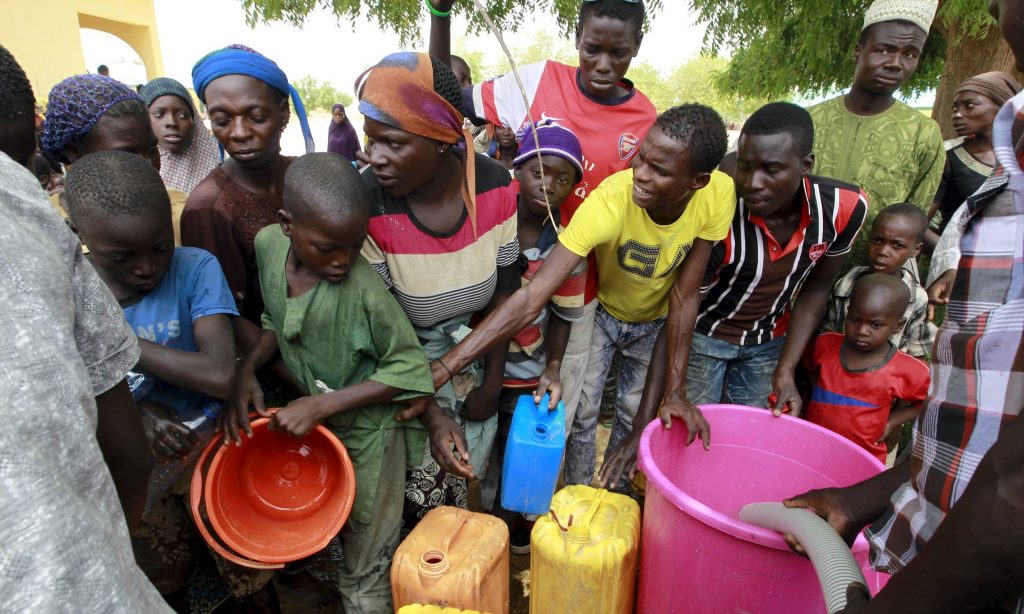
Photograph: Afolabi Sotunde/Reuters
The male recovery ward in the hospital is all in blue: blue sheets, pillows, curtains. Outside, the temperature hovers around 40 degrees: inside, large fans keep the air moving. All the beds are occupied by adults – except one. Eight-year-old Abba is the exception.
He’s hunched against the wall under the window, and he watches me carefully as I approach. I’ve been told he was injured when he was forced to flee his home, not far from here in Maiduguri, northern Nigeria.
At first glance, he doesn’t look too bad. Just a small bandage on his arm. Then I realise something’s not quite right. There is only one foot protruding from under the sheet. Abba has lost his right leg.
He looks at me, as if he expects me to say something, or do something. But what can I do? Suddenly, the electricity cuts out and the heat invades the ward.
Abba is just one of the many victims of an underreported conflict that has destroyed countless lives during six years in this remote area.
The Lake Chad region, which straddles the borders of Nigeria, Niger, Cameroon and Chad, has been ripped apart by conflict, with civilians deliberately targeted and killed.
The humanitarian consequences have been devastating: about 9 million people (pdf) need humanitarian assistance. About 2.7 million people, the majority from Nigeria, have been forced to leave their homes. Thousands have been killed or injured in the violence.
Back in Maiduguri, steam rises from communal kitchens feeding about 30,000 people at just one of the camps in the region. Most of these people were forced to flee their homes because of violence in the surrounding countryside between government forces and armed opposition.
Four women are cooking rice and beans in large pots over open fires. They do this three times a day. They greet me with smiles and laughter. Later, they tell me they’re worried that the world has forgotten them. “All we want to do is to leave the camp, go home, live under a safe roof. That’s all,” says one of them.
Every day, more people arrive here and at other camps. So many people lack the very basics of life: food, shelter, safety. A home. And there are so many children whose education has been cut short. Their schools have been destroyed or are being used as shelters.
The International Committee of the Red Cross (ICRC) has been doing its best: distributing food, providing medical support, helping to reunite families separated by conflict. But so much more is needed – right across the Lake Chad region.
In the short term, food needs to be delivered, shelters built and mobile clinics set up. More families need to find their loved ones, especially those children who have lost their parents.
In the long term, we need to provide materials so people can rebuild their homes; and they need agricultural materials, such as seeds and tools, so that they can grow food for themselves. Many people have been traumatised by their experiences: the mental health needs are huge.
In Maiduguri, we need to look at ways of improving the water treatment plant on which 2 million people depend. A second ICRC surgical team has already started to work in the town’s hospital, but more medical support is needed.
The violence is leading nowhere; just deepening the divides and the suffering. But one day, the conflict will end and the suffering will stop. And bridges will have to be built between the different sides.
It is vital that, even in the midst of conflict, all sides behave in a restrained manner: not targeting civilians or civilian infrastructure; not targeting medical facilities; maintaining the dignity of those held in detention. These are the foundations to build a better future.
Ultimately, it will be concerted political engagement that leads to a solution. And the sooner this happens, the better. This conflict, and its humanitarian consequences, can no longer just be left to fester. The people deserve better.
- Patrick Youssef is deputy head of the Africa region for the International Committee of the Red Cross

